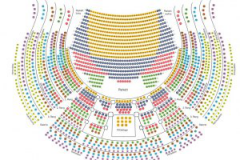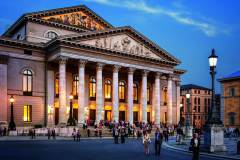The Marriage of Figaro-Munich Opera Festival
Mo | Tu | We | Th | Fr | Sa | Su |
Composer Wolfgang Amadeus Mozart. Libretto by Lorenzo Da Ponte based on the comedy La Folle Journée ou Le Mariage de Figaro by Pierre-Augustin Caron de Beaumarchais..
Opera buffa in four acts (1786)
recommended from 16 years
In Italian. With German and English supertitles. New Production.
ABOUT
Count Almaviva has himself abolished the iusprimae noctis, or "right of the lord". A fact, however, which does not prevent him from trying to seduce the Countess’s maid, Susanna, just before her marriage to Figaro. A clear case of sexual harassment. But, what happens when the culprit has plenty of money and power? Or, can even bend the law to suit their wishes? Le nozze di Figaro was more than just a comedy back in Mozart’s day. The world portrayed is brim full of criminal machinations and blatant fraud and chicanery by the powerful and almighty. Lorenzo Da Ponte’s libretto based on the scandalous play by the French revolutionary, Beaumarchais, leads the colourful characters of a comedy of the classes into situations so hopeless that emptiness and the desire to die spread to all quarters. And so the Count’s love for his new wife following their marriage suddenly goes ice-cold, although he has just recently spectacularly freed her from the clutches of her custodian. The resourceful Figaro of all people had helped him here, and in gratitude, the Count now employs him as his personal valet, perhaps as questionable compensation for Susanna’s harassment. Hardly conquered, the countess finds herself neglected and longs for either Almaviva's love or her own death. It takes a great deal of intrigue and counter-intrigue to disempower the encroaching count and allow Susanna's wedding to her beloved Figaro to take place after all.
With much love for tempo and situation comedy, the staging by Evgeny Titov examines the question as to why humanity proves time and again how fragile it is and where the weak points are. For this, the immense versatility of Mozart’s music unfurls its very own dynamic in the unleashing of jealousy and desire.
Program and cast
In Italian. With German and English supertitles. New Production.
Duration approximately 3 hours 30 minutes
Conductor: Stefano Montanari
Production: Evgeny Titov
Set Design: Annemarie Woods
Lighting: D. M. Wood
Dramaturgy: Katja Leclerc, Janine Ortiz
Choruses: Christoph Heil
Il Conte di Almaviva: Mattia Olivieri
La Contessa di Almaviva: Maria Bengtsson
Susanna: Louise Alder
Figaro: Konstantin Krimmel
Cherubino: Avery Amereau
Marcellina: Dorothea Röschmann
Bartolo: Willard White
Basilio: Tansel Akzeybek
Don Curzio: Kevin Conners
Barbarina: Eirin Rognerud
Antonio: Daniel Noyola
Mädchen: Seonwoo Lee, Xenia Puskarz Thomas
Bayerisches Staatsorchester
Chorus of the Bayerische Staatsoper
National Theatre Munich
The National Theatre Munich (German: Nationaltheater München) is an opera house in Max-Joseph-Platz in Munich, Germany. It is the home of the Bavarian State Opera and the Bayerisches Staatsballett(Bavarian State Ballet).
The Bavarian State Opera also performs in the Prinzregententheater, which opened in 1901 and, like the Bayreuth Festspielhaus, is built to Richard Wagner's specifications, and in the Cuvilliés Theatre at the Residenz, constructed in 1751–1753 and described by Thierry Beauvert as "a Rococo gem".
The Nationaltheater is very easy to get to both by car and by MVV public transportation.
By MVV public transportation
S-Bahn: S 1 - 8 Marienplatz
U-Bahn: U 3, 6 Marienplatz, U 3 - 6 Odeonsplatz
Bus: 52, 131 Marienplatz, 100 Odeonsplatz
Straßenbahn: 19 Nationaltheater
On the day of the performance, holders of regular tickets are entitled to use public transport provided by the Münchner Verkehrsverbund (MVV). This service starts at 3 pm respectively three hours before the performance commences and ends with the closing hour of the MVV.
By Car
Take the Altstadt-Ring to Maximilianstraße.
Parking garage Max-Joseph-Platz: open Monday to Sunday from 6:00 A.M. to 2:00 A.M.
You can take advantage of the special theatre parking fee of Euro 10,- from 6:00 P.M. to 8:00 A.M. by presenting your admission tickets.

 EN
EN DE
DE IT
IT FR
FR ES
ES RU
RU JP
JP RO
RO
 Seating plan
Seating plan 